In July 2021, UA&P School of Economics (SEC) faculty member Viory Yvonne T. Janeo received the distinction of being one of the first researchers of The Economy of Francesco (EoF) Academy, an international network of scholars formed with the aim of conducting and promoting scientific research on issues relating to the creation of a more ethical, sustainable, and inclusive economy.
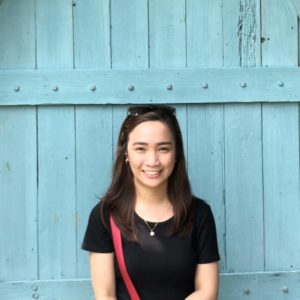
The Economy of Francesco is a worldwide community of young economists, entrepreneurs, and change-makers that developed following the invitation of His Holiness Pope Francis in 2019 to students, economists, and entrepreneurs under 35 to not leave anyone behind in the pursuit of a better economy.
The EoF research grants are awarded on the basis of, among other criteria, the candidate’s scientific production, the originality of the project, its consistency with the inspiring principles of EoF, and the attitude emerging from the proposal.
Read on and find out how one can take part in this initiative.
Tell us a little about your background as an economist.
I graduated from UA&P with a master’s degree in Industrial Economics. I started my professional journey as a consultant for the Department of Trade and Industry under the supervision of now-Undersecretary Ceferino Rodolfo. Shortly after that, I returned to UA&P to work for the SEC on a full-time basis. Aside from my teaching and other responsibilities, I have also been part of some consultancy projects with government agencies as well as established private firms and industry associations. I was likewise part of the Market Call-UA&P team led by Dr. Victor Abola, who I have had the pleasure of working with closely since I started working in UA&P.
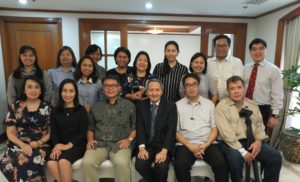
I am currently the Operations Committee Secretary for the SEC, and an instructor for subjects such as Macroeconomics, Microeconomics, International Business Economics, and Research Seminar. Since 2020, I have also been a Board Member of the Kalinangan Youth Foundation Inc., which allows me to participate in my spare time in activities for young and aspiring leaders.
Why did you choose to become an economist?
I have always had an affinity for math and social studies. I attended a science high school that had a competitive curriculum, and my exposure to challenging math classes was integral in honing my skills and appreciation for the subject. I took a basic economics class in my final year of high school and found it to be the perfect intersection between math and social studies.
This exposure to math and economics influenced my decision to apply for UA&P’s Industrial Economics Program (IEP). My time in the University taught me both technical and soft skills, which ultimately helped me realize the power of economics as a discipline and the extent to which many of the concepts we learned influence policy-making and national economic concerns in the real world.
What is The Economy of Francesco?
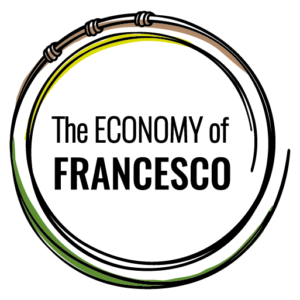
The Economy of Francesco, or EoF, was created in response to Pope Francis’ invitation for young people around the world to gather virtually to consider ways of making the economy of today and tomorrow fair, sustainable, and inclusive, as inspired by the example of St. Francis of Assisi. EoF features workshops, seminars, and lectures with leading experts in economics, sustainable development, and the social sciences.
It is a nascent organization that started less than two years ago, but it has already created a massive platform for young economists who are using their expertise to create sustainable change in different parts of the world.
Can anyone join the EoF School? How?
The EoF School community is mainly made up of young entrepreneurs, researchers, and changemakers working together to create a more inclusive and sustainable world by applying economic concepts to real-life problems. Although resources on its website are open to anyone, the EoF School is looking for participants who have an economic background and are below 35 years old. Outside of the Eof School, there are various groups, activities, and lectures that anyone can sign up for. You can refer to their website, francescoeconomy.org, for more information on this.
How did you learn about the EoF? What made you apply for its fellowship program?
I first heard about it through Dr. Jovi Dacanay (Program Director of the PhD in Business Economics Program). I checked the EoF website and found the workshop topics to be interesting. Although the lectures were usually scheduled at 11:00 pm local time, I decided to participate because of the opportunity to learn from experts in our field and also expand my network and meet like-minded people my age who have a deep appreciation for economics as a discipline.
In the midst of the program, EoF released a call for papers and proposals. I tried my luck and submitted a proposal. The timing was also right since I am currently doing my PhD, which is a requirement for interested applicants.
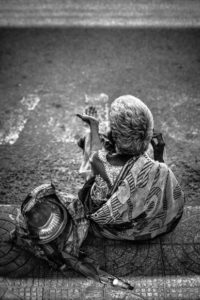
In one of the breakout sessions, I chose to participate in a group tasked to discuss the topic on “Poverty and Misery,” and it inspired me to think of a sustainable capacity-building project that will help address poverty through financial literacy education and values formation. My hope has always been for the recipients to be empowered and motivated to pay it forward by sharing their newfound knowledge with others, igniting the bayanihan spirit in each of us.
I was also in touch with a friend who shared her sentiments about those who are not able to access decent education and health services because they lack the financial means. Based on these discussions, we are thinking of putting up a foundation to help the poor. This vision will take many more years to come to fruition but this financial literacy and values formation project seems to be a step in the right direction.
How did you learn that you won the research grant? Can you tell us how much the grant is?
The Scientific Committee sent us an official communication last July. We also had an online event where the winners were acknowledged and officially recognized as part of the academy.
I have yet to confirm the amount but from what I know so far, all selected recipients will receive EUR 5,000. It is not a huge amount but it will be more than helpful in getting my project proposal off the ground. Aside from the grant, chosen fellows also have the honor of working with esteemed members of the EoF community who will serve as mentors throughout our program implementation. I find this opportunity just as valuable as the monetary support I have been given as I tackle this project.
How does it feel to be one of the first researchers of The EoF Academy? How many of you were chosen from among the applicants?
I am honored and happy to represent not only UA&P but the country as a whole since I am the only recipient from the Philippines. Ten applicants were chosen to receive the grant, with five other applicants volunteering to be part of the academy even without the grant.
An international conference of the same name occurred in November 2020, where lectures and workshops were streamed live from different Franciscan places in Italy. Were you part of that conference?
Unfortunately, I was not part of that event. The EoF School, which is the program I am currently attending, began in March this year and has proven to be an insightful and fulfilling experience on its own.
This coming October 2, there will be another online global meeting, live from Assisi. Anyone can take part in the exciting activities, including talks, discussions, and webinars. I would like to encourage everyone to check the webinars out before the main event. I believe the October 2 event and the other activities organized by the EoF is going to be worth our while.
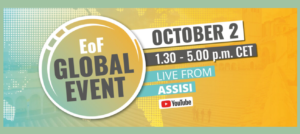
The EoF Scientific Committee Director, Luigino Bruni, described The Economy of Francesco as “the largest movement of young economists in the world.” Have you had the chance to meet some of these economists? Are there other Filipinos there too?
Yes, but only online. With the pandemic still making it difficult for in-person meetings to happen, the EoF School facilitates sessions for participants to get to know each other virtually.
Yes, there are other Filipinos attending the EoF School, one of whom is my colleague from SEC, Meg Agner.
Tell us a little about your proposed research project. What do you want to accomplish through it? Who will benefit from it, and how?
My research proposal aims to address the gap in financial literacy, specifically for families of Overseas Filipino Workers (OFW). My goal is to develop or improve existing (if any) financial literacy modules that can be used to raise awareness among OFW families on proper financial management. This module will hopefully motivate them to better manage the hard-earned income of their overseas family members. It could also empower and motivate them to improve their way of life, step out of the poverty trap, and be able to educate the rest of their relatives. I believe in the long-term and sustainable impact of the proposed financial literacy and values education project on the lives of many Filipino families.
Through this initiative, I hope to better understand the spending motivations of OFW families and the appropriate intervention (through needs assessment) that would encourage them to be more discerning about their use of money.
Will your participation in the EoF continue after you completed your project?
Yes. I also signed up for other activities outside of the fellowship because I like the spirit behind this movement, and I am optimistic about the potential impact it will allow us to create.
How do you think your participation in the EoF will affect you as a young person, as a teacher and economist, and as a Filipino?
Participating in the EoF has influenced my worldview for the better. Being part of a global community allows me to learn from the experience of other participants operating in different contexts and situations. It is quite an eye-opener to the truth that the challenges that we face in our country are not unique to us; even more developed countries deal with the same institutional roadblocks that prevent us from achieving our full potential as a society.
Beyond that, I am moved and inspired by the determination of the participants to help those who are often overlooked and underserved. It has further fueled my desire to help the underprivileged by creating a more inclusive economy for the Filipinos – an economy that will encourage participation and equitable distribution of resources for all. Quoting a line from EoF’s final statement and common commitment: “We are convinced that a better world cannot be built without a better economy, and that the economy is so important for the lives of peoples and the poor that we all need to be concerned with it.”
Banner photo by Enrico Tavian on Unsplash.
Very enriching views, Viory. Congratulations. Such a well-deserved prize. I got interested in the notification I received because I am a fan of Professor Luigino Bruni, whom I met last 2009, when he gave a lecture in the School of Social Sciences, ADMU. He is very much involved in the Economy of Communion Project. Pope Francis’s economics is so in sync with the Economy of Communion mission and vision. I immediately thought that this is a way to engage young economists in the view that Economics is a humane science, and we can work together to sustain this.